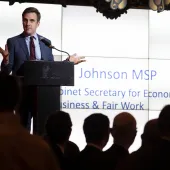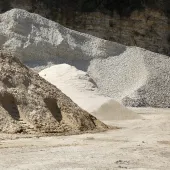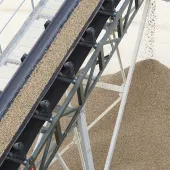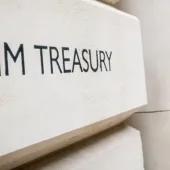Aggregates Tax Faces New Legal Challenge
Robert Durward, director of the BAA, explains why the Association is taking the Government to the High Court
The past few years have been traumatic for the quarrying industry. An unprecedented number of quarries and personnel have been lost due to a seemingly endless round of takeovers and mergers. The industry, however, may be about to witness destruction on an even greater scale as the result of the aggregates tax.
The quarrying industry is unique. It is not a 'transportable' industry, in that stone can only be quarried where it exists and where there is a market within economical reach. Although this should have protected the quarrying sector from the scale of consolidation experienced by many other industries, quarrying has in fact suffered a great deal and a huge number of companies have been swallowed up and closed down. The vast majority of these were once successful, thriving businesses and an asset to their local communities.
In 1960 there were in excess of 5,000 quarry companies but by 1970 this number had fallen to less than 3,000. Today there are only some 240 private quarry companies left on the mainland with a further 130 in Northern Ireland. Those that remain will face impossible costs and increased international competition as a result of the tax. The aggregates tax will hand overseas competitors a huge advantage and imports will flood in. The industry will also become even more of an internationally owned business operated by a select few, rather than a genuine local industry with numerous healthy, competitive independent firms.
Unfortunately, it is not just quarry operators who will suffer; there are 1,380 quarry plant and supply companies listed in the 200 112 Directory of Quarries, Pits and Quarry Equipment. Many of these firms provide products and services unique to the extractive industries and many have already suffered as a result of the collapse of the coal industry (a number of these companies have become associate members of the British Aggregates Association in a welcome expression of support).
The present crisis is effectively a fight for survival. Few companies will escape unscathed, although one or two who are vertically integrated may fare slightly better. The overall effect, however, will be catastrophic and will dwarf the recent episodes of mergers, closures and redundancies.
The BAA and the aggregates tax
Since its formation in October 1999, the BAA has stated consistently that there is no justification for the aggregates tax, that it would disadvantage small companies much more than the majors, and that it would end up being far too complex to be operated fairly. It is set at a bizarre level of £1.6 per tonne, which is not only four times greater than most operators' profit, but also four times greater than any similar tax elsewhere in
Europe. In fact the great majority of EU countries either do not have any form of aggregates tax or, if they do, it is pitched at a few pence per tonne. In France, for example, it is the equivalent of 6p per tonne.
Not only will the tax fail to achieve its environmental aims, but, in many parts of the country, it will become virtually impossible for 'aggregate only' companies to compete in the marketplace. It is transparently obvious that the tax was conceived and designed without sufficient knowledge or understanding of the quarrying industry. It is quite plainly a bad tax and one which cannot achieve its stated aim of increasing recycling, as little potentially recyclable waste remains (1-3% maximum). In addition, many alternative materials could have a much greater environmental impact than quarrying (eg steel and plastics) or be less durable (eg wood). Recent government guidance recognizes that recycling simply for the sake of recycling is often neither justifiable nor even sustainable.
Furthermore, the tax is likely to damage the environment by causing increased haulage distances from fewer quarries as well as a new problem of byproduct waste mountains. It will inevitably drive up imports as it is now often cheaper to ship in aggregates in bulk from overseas than to deliver them by road from UK quarries. Precast concrete producers will have tremendous problems as they will now have to compete with untaxed imports. Phasing in the tax in Northern Ireland will cause problems for mainland producers, as Irish precast concrete products are already to be found the length and breadth of Britain, and it will offer no worthwhile protection for the people of Northern Ireland either.
Civil servants and the aggregates tax
During the past two-and-a-half years the BAA has made a great deal of progress towards convincing the machinery of government that it may have made an enormous blunder with the tax, and many civil servants now share the Association's concern. The legislation has become horrendously complex and is still a very long way from being workable. Nevertheless, the Treasury seems determined to steamroller the tax through, warts and all.
Politicians and the aggregates tax
A growing number of MPS from all parties are now expressing concern about the effect of this draconian tax on the fabric of their constituency as well as the effect on their constituents themselves. There is already a great deal of public disquiet about the state of the UK's roads and this tax will mean that not only will the country have the poorest infrastructure in Europe, it will probably also have the most expensive construction and maintenance costs too.
Parliamentary questions continue to be asked and it is clear from the poor quality of its answers that the Government is struggling to offer any credible justification for its policy. There is also a possibility of parliamentary procedure being used to generate a debate. The tax came in for unprecedented criticism in a recent Parliamentary Select Committee report which stated that the Government's research 'does not withstand scrutiny as a rationale for discouraging aggregates extraction or encouraging recycling'.
The regulations for the aggregates tax
With just a few weeks to go before the tax comes into effect, the Government is in disarray. Despite Customs and Excise working flat out since April last year to finalize the various clauses, little progress has been made. Changes to the tax have been promised but not delivered and regulations to implement it have not yet been published. However, even if they were to be published immediately, there is little prospect of SME quarry companies being able to adapt to, or survive, this punitive measure.
Furthermore, continued delay in publishing the regulations means that it even falls foul of the Government's own guidelines which state that business should be given at least 12 weeks (longer in the case of complicated legislation such as this) to prepare for any new legislation. The uncertainty created by the tax is causing chaos across the quarrying, civil engineering and construction sectors, where materials supply contracts can be fixed for up to five years in advance.
Issues which need to be resolved before the tax can be implemented include:
- the legal definition of a 'taxable tonne'
- regulations dealing with those aggregates to be relieved of the tax
- regulations dealing with the registration of sites
- legislation relating to long-term contracts, especially in the added-value sectors
- legislation to deal with mineral leases which are 'index-linked'
- the last Customs and Excise Brief (17/2001) listed 10 further amendments; these have not yet been legislated for.
The postponement of the Budget to 17 April has added a further complication, as the changes to primary legislation were to have been made in the Finance Act 2002, before I April. This will not now be possible.
The law and the aggregates tax
With time and options fast running out, the BAA has taken the legal action necessary to protect the quarrying industry. The Association, together with three named companies, has launched a bid in the High Court of Justice in London to have the aggregates tax declared illegal. The BAA is also seeking an injunction to prevent the tax being introduced on 1 April, or until such time as the full case can be heard.
The Association has retained Herbert Smith, London's leading litigation law firm, together with Gerald Barling QC, one of the foremost practitioners of EC competition law. Mr Barling has already successfully challenged the Government under the new European Convention on Human Rights (ECHR) legislation.
The BAA's lawyers will argue that the tax contravenes EC law by distorting competition, in that it offers illegal state aid to products such as clay, slate and colliery waste, which compete with aggregates; that it is a direct and not an indirect tax, which means that certain reliefs and exemptions are also illegal; and that there is insufficient justification for a tax of this magnitude, thus contravening the ECHR.
The dangers of legal action
Some in the industry have expressed concern that legal action against the tax could endanger the few concessions and exemptions that have been won from the Government.
However, these paltry measures only make a disastrous tax marginally better. The industry should certainly not be seduced into meekly accepting the tax, but should continue to fight it by all possible means. The Government has not been able to justify the tax to the industry, and the BAA fully expects that it will struggle to justify it to a court of law.
BAA support
Although it might seem daunting for such a small sector to take on the might of the Government, the BAA is recognized for punching well above its weight. It is a fully democratic organization run by experienced quarry operators and, when polled, its members were 10 to 1 in favour of taking legal action. The necessary underwriting is now in place and the Association has also received pledges of support from other, non-member, operators.








